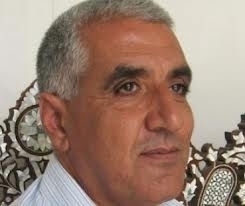On 2 October 2014, two years will have passed since the arrest of the lawyer Khalil Maatouk. He will reach his 55th birthday without his daughter, wife, son and close friends there to celebrate with him.
Though Maatouk has not practiced politics for over two decades, he was arrested by the Syrian security forces after he left his house in Sahnaya with his friend Muhammad Zaza to his office in the al-Baramkeh neighborhood in the middle of Damascus. The arrest probably took place on the Damascus international highway or in front of his office.
By the end of October, it was known that Maatouk had been detained at a State Security detention facility in the Kafar Souseh area of Damascus.
"The detention was made via a decision by high-ranking officials in the regime," one of Maatouk's friends wrote on his Facebook page.
"We cannot talk about Khalil Maatouk without talking about his detention for over 22 months. The first things that come to our minds are the horror of his cell, his health situation which needs constant attention, and the suffering of his family, especially his daughter, Ranim, who patiently bore his absence," wrote Muammar, one of Maatouk's many friends, on Facebook.
"When Ranim was arrested to put pressure on her father, Muammar said: "All of Syria's daughters are Ranim".
For 25 years, Khalil Maatouk defended dissidents and political detainees in front of State Security courts and civil courts, paying the costs out of his own pocket and the bails of detainees to defend them. He was so poor, he never wore a new jacket until his old one was torn, and when he bought a new leather jacket, he was so happy to wear it wherever he went.
The only guilt Maatouk bears is that of a man of dialogue with a great heart. He was the Executive Director of the Syrian Center for Legal Studies and Research, and the head of the Syrian Center for the Defense of Detainees, as well as a member of Syrian Lawyers Union, however the union has never called to release Maatouk because unions in Syria are following the security branches.
Khalil might have been the only activist who gathered human rights organizations and different types of individuals together. He has never mixed his work as a lawyer with the political and ideological backgrounds of others and was a successful mediator between the civil society organizations and the opposition factions.
"Everyone respected him," said his friend Wael Sawah.
Maatouk is from the town of Mushrefeh in Wadi Nasara. He is the father of Majd and Ranim, who was detained for months after her father, and his wife is the well-known short stort writer, Fadia Saad.
His children didn’t know whether they are Christians or Muslims until they became mature.
"Maatouk didn’t tell them because he believes in Syria as a democratic state, where the rights of citizenship are guaranteed without any other details," said his friend Muhii Al-Din Isso.
Friends issued tribute to Maatouk.
"Maatouk defended the sons of Syria, without discrimination between the Arab, Kurdish, Syriac, Muslim or Christian groups. He was courageous and was never afraid of arrest or elimination, despite the frequent threats from the security forces", said the journalist Muhii ad-Din Isso.
"Khalil Maatouk dedicated himself to advocate the oppressed and the freedom of speech. Two days before his arrest, he called me about the martyrdom of our friend, Dr. Osama Barakat, and we attended his funeral in Jaramana together a day before his arrest," said fellow lawyer and friend, Michel Shammas.
Everyone who knew Maatouk knows that he dedicated himself to the freedom of detainees, that is why he was optimistic, smiling all the time.
"His smile was so beautiful when he succeeded in releasing a detainee or got news from him. I remember this today because it is hard to get any news from him or about the location of his detention, especially that the calls and pleas to release him are now limited to only his family, his friend Michel Shammas and few other friends. Abu Ranim, as he would like us to call him, was one of the most noble and generous persons I have ever met," said his friend, Muammar.
Only in Syria, the presidential decree pardoning detainees includes thieves, murderers and prostitutes, but excludes political prisoners.
"What is the use of a decree that excludes tens of thousands of detainees, the same detainees who haven’t been charged yet, though have been subjected to all kinds of brutal torture under inhuman conditions? What is the use of the decree as long as there is no independent, neutral or just judiciary? What is its use when there are discriminating courts? We don’t need a decree, we need justice," said the lawyer Anwar al-Bunni, referring to the presidential decree which released hundreds of criminals accused of drug abuse, murder, theft and fraud but ignored the political detainees.
"The decree didn’t include Maatouk and the political detainees because they are not criminals, they are advocates of peace, human rights and freedom of expression," explained Shammas.
Maatouk's doctor says that he suffers from an immunoprecipitation lung inflammation and he needs constant treatment. When he was arrested, 60% of his lungs were not working, and the arrest took place only few days after his return from a journey for treatment abroad.
Maatouk comes from a simple Christian family from the countryside of Homs. We mention this only to remember the attitude of the free Christians who faced the Christians defending Assad and Hezbollah in Washington. When Assad's supporters said that he is the protector of Christians in Syria, those free voices asked them: "And what about the detention of Khalil Maatouk?".
Translated and edited by The Syrian Observer
......


